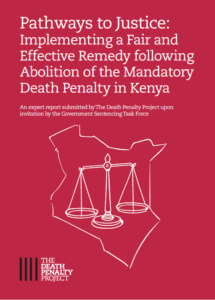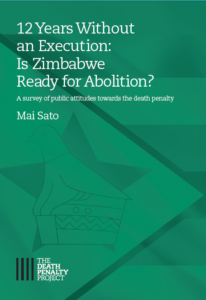Pathways to Justice: Implementing a Fair and Effective Remedy following Abolition of the Mandatory Death Penalty in Kenya
- Reports and Studies
- 25 Jul 2019
In December 2017, in Muruatetu v Republic of Kenya, the Supreme Court of Kenya declared the mandatory death penalty to be unconstitutional. In reaching its verdict, the Court relied on jurisprudence from other Commonwealth countries where the mandatory death penalty has been found to violate fundamental human rights. Kenya is the 13th country where we have successfully brought and/or supported local lawyers in constitutional challenges on the issue.
As part of our decade-long work in Kenya, we were admitted as amicus curiae in the Muruatetu appeal. After the Muruatetu judgment, we were invited to assist and advise the Task Force on Review of the Mandatory Death Sentence in relation to developing a process for implementing the decision and giving relief to the thousands of individuals unconstitutionally sentenced to death. As part of this assistance, we submitted this report in late 2018.
This report draws on our experiences in other jurisdictions where capital sentencing laws have been struck down or abolished, thereby generating the need for prisoners already unlawfully sentenced to death to be given substitute sentences. It delineates the ways in which other common law jurisdictions have addressed the practical and procedural challenges of resentencing following the abolition of the mandatory death penalty – navigating potential human rights infringements and ensuring that satisfactory requirements of due process are met. Resentencing procedures must also be scalable and practically accessible to the large number of individuals (thousands in the case of Kenya) entitled to relief. Our report addresses these challenges head on.
The report also includes a section on deterrence and the death penalty, authored by Professor Jeffrey Fagan (Isidor and Seville Sulzbacher Professor of Law, Columbia Law School), entitled ‘Deterrence and the Death Penalty Internationally and in Kenya’. Professor Fagan’s report makes clear that there is no evidence that executions have a greater deterrent effect on homicides than punishment by life incarceration, and that there should be no expectation that executions will deter homicides in Kenya (or elsewhere).
We hope that this report will be of assistance to policymakers and advocates in other jurisdictions faced with similar challenges. International human rights law requires that retentionist states ensure strict adherence to safeguards governing the imposition of the death penalty while progressively restricting its use and, all the while, moving towards abolition. But where the death penalty (or the mandatory death penalty) is restricted or abolished, governments must decide on replacements that themselves avoid infringing on fundamental human rights.





